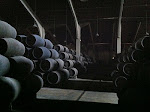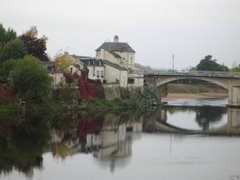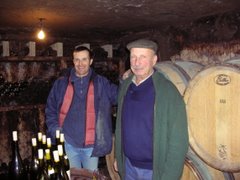Friday Night Bubbles

Why am I telling you all this, if this post is supposed to be about Binner's Crémant d'Alsace? I guess I wanted to make it clear how great I think this producer is, and how special their still wines are before telling you that I am not crazy about their Crémant. I've tried it before at one tasting or another and never loved it, but the other day at the tasting it impressed me. So I purchased a bottle on my way home to drink with the BrooklynLady. Tastings are a great way to learn about wine, but for me the only way to discover my own truth about a wine is to drink it at home, slowly, with a meal. Not a novel concept, but I'm telling you anyway.
This Crémant is mostly Riesling at about 70%, with some Auxerrois and Pinot Gris in the blend too. It is aged for three years on the lees, it was disgorged in May of 2008 and topped up with more Riesling - no sugar or concentrated must in the dosage, hence the Extra Brut status. There are some lovely things about this wine. It has nice texture and there is a telltale Riesling bitter fruit pit character. The flavors are round and clean, and the wine has a pleasant lightness to it. But as I drank it I thought of something that Peter Liem said about extra Brut wines:
Non-dosé Champagne is highly fashionable in the Champagne region right now, but few people really do it right. The problem is that in order to make good non-dosé Champagne, you have to work exceptionally well in the vineyards, to achieve fruit that is ripe enough and complete enough to stand on its own. You can't just take your regular brut NV and decide that you won't add any sugar to it.The Binners without question work exceptionally well in the vineyards - they craft gorgeous still wines year after year. And reasonably priced wines too, by the way. But the 2004 Binner Crémant lacks resonance and depth, and it feels a bit stunted. I gave it the old "how does the wine taste after you leave it out all night" test, and it didn't do so well. I think that it would benefit from a few grams of sugar in the dosage, as un-hip as that may sound. Or maybe it is a lesser selection of grapes used to make the Crémant, who knows. Or maybe this is great wine and I don't know what I'm talking about.
Anyone had this wine and care to share their opinion?







10 comments:
reflecting on a wine by incorporating it into the table is a surprisingly foreign concept here in america.
haven't had this one, though!
I cannot really understand what you have against that sparkling wine. Can you be more specific, please (I can understand lack of depth but lack of resonance is not crystal clear to me)?
I recently opened few Cremant from Binner and they were all excellent and satisfied my guests. Yes, it is rather a mineral wine, with some flower taste.
Maybe 2004 was not an excellent year, and Christian surely does not use his best grapes for Cremant, but this wine, is still much better than most expensive industrial Champagnes.
I don't think adding sugar would have helped. And I don't think this kind of wine has been designed to resist the night opening test.
I probably taste over 50 wines a week, and I still have yet to find a Cremant that I actually enjoy (no matter the price). I understand and appreciate the style and uniqueness, but I still wouldn't buy it. You either like the taste and texture, or you don't.
Brad: You dislike all sparkling wines or is that just against Cremant? In the second case what kind of sparkling wines do you drink? I personally never drink Champagnes, most of them are just not wines, but industrial drinks like Coke. You'll find a lot of good sparkling wines in Loire, Alsace, Rhône. Many young winemakers now propose good sparkling natural wines. And their texture is often much better than the expensives chemical champagnes.
Cremant I like. I have a couple of bottles left from the hunawihr co-op in Alsace
hey Tracie - i hear you, but i bet it's common among your friends and it is among many of mine too. say hi to my friend 2 glasses for me please.
Hi Erix - i don't have anything against the wine at all, i enjoyed it. I just don't think it's as good as Binner's still wines, or as some other Crémants D'Alsace that I've had. By resonance, I mean exactly that - there are wines that offer resonant flavors, flavors that stick around for a while and echo off the walls of my palate and nostrils. This isn't one of them. That does not mean it's a bad wine, it just means that there are others at the same or lower price that i prefer. regarding the Champagne comparison, I agree that I would drink this wine over Veuve and Moet and all sorts of mass produced wine. But if you poke around a bit on my blog, you'll see that the Champagnes I like to drink are not industrial wines. And I would drink them over any Crémants D'Alsace that I've ever had, without exception. But that's just me. Your taste is your own and I totally respect that. I appreciate your comments.
Brad - Have you tried Dirler's 05 Brut?, I really like that wine, and it's barely over $20 in NYC.
Hey Weston - never heard of that one. A west coast (or Canada only) import? Hope all is well.
Hello Brooklyn Guy,
I didn't mean to be rude or arrogant. Yes, there are still few good champagnes, (Selosse, Gimonnet, Krug, for instance) but they are all very expensive. Don't try to find a good champagne below 130USD.
My point is that, in general Champagne and Bordeaux are two dead areas, not the ones where you'll find good wines at a good price. You will just find people interested in making money, not wine. This is obviously not 100% true... only 99.
There is a new generation of young winemakers, Ch. Binner being among them, trying to produce good wines without chemical products, without too much sulfites, etc. They also produce sparkling wines, and I think it is important to support them.
I think that by definition, in the same estate, sparkling wines won't be as good as still wines... This is exactly why bubbles have been invented, to save some wines that otherwise you would not drink.
Champagne wines are generally lacking sugar, they are "green" and too acid, just because Champagne is a very Northern area, with very cold winters and quite often rainy summers (not the same weather as in Burgundy or Alsace).
Thank you for your definition of resonance. I'm new in the US and my English is awful. I understand your resonance is what we call persistence olfactive or retro-olfaction in France.
Congratulations for your blog, it is quite interesting and one the few american ones I regularly read.
hey Erix - i didn't take your comments are rude at all, don't worry. your profile says you're in Paris so i assumed that (although you write better than many americans) english is not your first language.
i agree about binner and others like them, and they definitely get my support. i don't know anything about bordeaux and don't drink the wines, but again i dosagree about what you say about Champagne. There are many naturally made beautiful wines that you can buy here in NYC for $50 and under.
take a look at some old posts on my blog and you'll see what types of producers i support. thanks again for you comments.
I have updated my profile. I now live in Washington DC.
To me, Champagne and Bordeaux are the 2 worst examples of French wines. There, it is an industry like in California, and they just want to please Mr. Parker and get their >95 notations.
Wines in Champagne have special rules that no other area has in France: they can mix several millésimes, they can add sugar, they can add sulfites with no limit, they can add liquors, enzymes. It is just not wine, I mean something coming from grapes. It is more like fragance, perfume or chemical industry if you want.
And they try to change laws in France so that they can go further (Bordeaux producers want to permit addition of wood chip in casks, for instance).
So OK, you will still find some rare producers, with some kind of deontology, but that is definitely not the rule in Champagne.
A good champagne should be, first of all, a good white still wine, in the burgundy style, with bubbles added. Today this less than 1/000 (one thousandth) of the production.
The only drinkable champagnes are those with a Millesime, RM tagged (stands for Récoltant Manipulateur), and non-dosé (no sugar added). That's is the only guarantee that you will drink a WINE, otherwise it is pure chemistry. Please give me only one name of non-dosé, millesimed Champagne below 130 USD in New-York. Even at Chambers Streets or at Astor Wines you will not find them (I was there last 2 weeks ago).
I really think your readers would prefer to discover interesting sparkling wines at affordable price, coming from less industrial regions. They will feel the "terroir effect" in Loire valley, in Alsace, in Rhône valley, something totally different from what one can get in Champagne.
Anyway, that is an interesting challenge: as a French burgundy/parisian guy I would love to be convinced by you about Champagne :-)
I'll keep my mind opened. Conversely, I don't want to change your ideas about Champagne, if you like it, that's fine.
I have stopped my blog before moving to the US. It was in French and not limited to wine. But I have referenced dozens of excellent natural sparkling wines over there.
Maybe I should start a new one in English (as soon as my English will be better :-)
WOW Amazing Article!!! I wanted to thank you for this great read!! I definitely enjoying every little bit of it smile I have you bookmarked to check out new stuff you post.
vintagecellars.com
Post a Comment